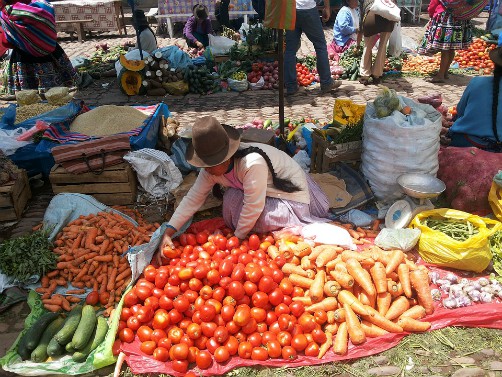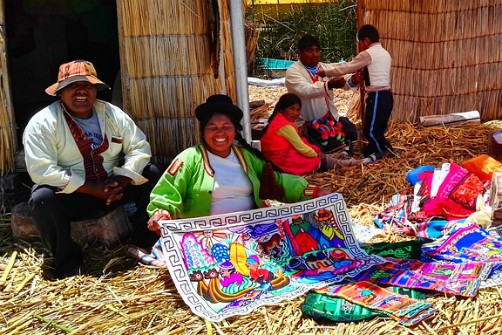|
Bargaining Doesn't Have to Be Scary! Bargaining (negotiating or haggling over the cost of an item) can be an intimidating experience for anyone who is accustomed to seeing clearly marked prices in stores and markets. In fact, bargaining can be absolutely nerve-racking to someone who's never done it before. But before you get too worried that you'll never get the hang of it, take a deep breath and read the following tips and examples. Learning to negotiate prices in Bolivia can actually be an entertaining experience once you've gained some confidence. It’s a commonplace practice here, even expected of shoppers, so there’s no need to be shy about it. However, there is a time and place for everything, and price negotiation is no exception.
Shopping and bargaining are even more difficult when you don’t speak the vendor’s language, but even when you do, mistakes can happen and you just have to laugh about them and keep them as a fun memory of your trip or Bolivian living experience. We know what it feels like to be unfamiliar about shopping customs in a foreign country, so we've put together the following tips on how, when and where to negotiate, or not negotiate prices while shopping in Bolivia. Bargaining in Bolivia: When Not ToLet's begin with the easy stuff, which is when NOT to get into a bargaining match with a seller. There are places where prices are not negotiable.
1. You will not usually bargain prices in formal business establishments (and by this we mean supermarkets, brand name stores, import stores, or any other store that has clearly marked or set prices for each product). This includes hotels and restaurants. These stores are typically part of what is called the "formal" commerce system. Stores that are duly registered with the government and have tax payer numbers will always have set prices because they must use an electronic inventory system and issue invoices. See our page on the Bolivian sales tax for a more detailed explanation. 2. You will not usually engage in bargaining in restaurants, cafés, bars, ice cream parlors, or anywhere else you eat, but there is an exception to this: if you plan to reserve a table at a restaurant for a large number of guests (say, more than 10) and you alone will be paying for all of them, you might contact the owner in advance, in private, and arrange for special pricing. (Sort of like when you contract a caterer for an event). 3. Please don’t negotiate prices if you are buying from a street vendor who is obviously just barely making a meager living and you are obviously more than wealthy enough to afford what you’re purchasing. See more about this under our Bolivian currency and Bolivian shopping etiquette pages. 4. You cannot bargain prices at gas (petrol) stations. All gas stations in Bolivia offer the same price for natural gas, gasoline and diesel. That's because the price they sell at is set by the government. They do not set their own prices and legally can not charge less or more than the national government dictates. 5. Bargaining is also not done at bars, discoteques, bowling alleys, movie theaters, museums, arcades, video stores, or any other form of entertainment, nor with doctors, dentists, hospitals, clinics, pharmacies. 6. Never bargain with a public employee at any government agency or store, especially if your purchase involves your visa, driver’s license, residency application, or any other legal or travel-related document or matter, even if they offer to do so. If any public employee offers to "negotiate" with you, what they are really asking for is a bribe. Engaging in bribery can land you in jail, and you don't want to know how bad Bolivian jails are. Just trust me on this one. Bargaining in Bolivia: When It's OK
The following are occasions and places where you can expect sellers to be open to bargaining with you: 1. Do feel free to bargain with vendors at open markets. They are used to it. In fact, they expect it of you. They assume foreigners can pay more (even if you really can’t) and most likely, the price they offer you initially is already higher than the norm. Of course, this does not mean they will be willing to lower their price. See our bargaining “how-to” list below. 2. You can negotiate prices with vendors you buy from regularly such as your tailor, a caterer, or people who are providing you a service on a regular basis. In fact, if you don't, they will charge you their higher "foreigner" prices every time you visit them. Because they can. Because you never asked them not to. 3. Do discuss prices with taxi drivers (before you get in). If you ask the cost of a ride after you get in, you won’t get a discount, and if you wait to haggle the price just as you are being dropped off at your destination in the middle of traffic with dozens of cars honking angrily around you because you're causing a traffic jam... well just don't do that. 4. Do bargain with vendors who offer to bargain first. Usually this will happen at open markets. Many times a vendor will say something like this: “This pair of shoes costs Bs. 100, but if you buy 2 pairs, I’ll give you a discount”. They’ve made it clear their prices are negotiable, so even if you only buy one pair, feel free to open up the bargaining process. Offering a lower price for multiple purchases is a very commonly used sales practice, so these are the times when bargaining can actually be fun. Because when you leave with what you feel is a great deal, you just feel so proud and accomplished! 5. "Con factura o sin factura?" This means "Shall I sell this to you with an invoice or without an invoice?" What does that even mean!? This is a question frequently asked when you are buying in a store that is part of the "formal commerce" system. This means the store is registered with the government, has a Tax I.D. number, charges sales taxes and issues you a receipt or invoice. The store must then pay the Bolivian sales tax they charged you, to the government. The government knows how much the store charged you because copies of all sales receipts or invoices are turned in by the store each month to authorities. Frequently, vendors will ask you this question when you ask the price of something. In the bargaining game, this is one of the tactics used by vendors to lower the price for you without losing any money themselves. What this really means: If you tell them you do need an invoice, then the price they quote you will include the sales tax. If you don't need an invoice from them, they will quote you a lower price and not charge you the sales tax (currently about 15%). What this means for them? Having not issued an invoice to you, they don't declare this income to the government and thus don't pay taxes on it either. Is it legal? No. Does it happen thousands of times every day throughout the entire country? Yes. Should you agree to purchase without an invoice in order to save money? I guess that depends on whether or not you might need an invoice for your own tax deductions, or as proof-of-purchase should you need to return or replace the product. Moreover, it depends on whether or not you are willing to help someone with a little something called tax evasion. Our opinion: don't go there. Always get an invoice. So how do I learn to bargain like a pro?Again, lets begin with what NOT to do. NEVER show how much you like or are interested in a product. Don’t express your eagerness, amazement, joy or do any “ooooohing” or “aaaaahing” until after you’ve settled on a final price. (It’s already obvious enough that you are a foreigner and it is a general assumption that foreigners are loaded and rich, especially if you are a tourist and not a resident because if you have money for leisure, the assumption is you must have more money than you need.) So even if this is not true, if you make it obvious how much you like or want a product, you’ll never get a discount. If you do this, you can forget about bargaining at all. Bargaining is sort of an art form, but you can learn it and eventually, you may even consider it immensely satisfying because when you've negotiated a price yourself, you may feel very accomplished and of course, happier with a price you helped determine.
1. Your first step is to ask the price of an item. Always assume the initial price quoted is too high. You should, at this point, be keeping a very non-chalant attitude like "Oh cute item, I could take it or leave it really but since I'm here, I might as well ask how much it costs..." 2. When you are told the price, express a little disappointment. Like, oh I wasn't expecting that...too bad it’s so expensive. You can either say that aloud or just think it to yourself and change the expression on your face to show a bit of disappointment. 3. Ask the vendor if they have a similar item that might cost a little less, or directly ask for a discount. Don’t suggest an actual price yet, just ask something like "No me lo rebaja un poquito?" which means “Would you be willing to lower the price just a little bit?” 4. The seller may offer you another item but will usually take this as a sign to begin lowering the price on the item you really want and will quote you a lower price. 5. Once they give you a second price, you may actually think it's a great price and accept. Or, if you think it's still too expensive, you can offer to pay just a little less than the price they quoted you. Don't offer something ridiculously lower, just slightly lower. After all, they are selling to make a living too. 6. They’ll either offer you a third price or let you know that they can't lower the price any further. If you are happy with it, take it. If not, you can tell them you really appreciate it but you just can't afford it ("I can't afford it now, maybe next time" is a kinder, gentler, friendlier thing to say than "Your price is still too high" which puts them on the defense). Begin to walk away. 7. This will lead them to either let you go (after all, they know their lowest limit and they can’t give their products away), or they’ll offer you a final lower price, or run after you to get your business. 8. Basically, there’s a sort of a general percentage scale to use when bargaining: Generally speaking, they'll suggest a price, you offer around 70-75% of it, they counter with 90% and you'll both end up agreeing on 80-85%. 9. Do not underestimate little kids because a) they may look little but are probably older than they look, or b) if they really are little kids, as in very young, they've been working the shop for a while and they know how to handle themselves and you! According to government statistics 848,000 children under 12 work in Bolivia and 42% of them are seasoned sales experts!!! 10. You may often see someone who is extremely poor, sick or homeless, or very elderly trying to sell something as they walk along the streets (candies, pens, cigarettes, other small items). Please don't ask them to lower their prices. Bolivia's social assistance and pensions system sucks and they really, really need the money. Becoming an Expert Bargainer: Disinterest and Confidence are Your Weapons in the Price War
You want to buy a basket from a vendor in an open market. You've looked around, they've seen you looking around, you've maybe touched a few baskets, or visited some of the vendors around said basket vendor... you are walking around slowly and kind of aimlessly as if you really had no intention of going shopping today, you just kind of ended up here. You've shown barely any interest, only enough for them to see you meh... maybe could become interested if the price is right. Once you've mastered the art of not oggling people and things like a vulnerable tourist (even if you are a tourist), you've already lowered the price without ever saying a word. Disinterest and confidence are your two greatest weapons in the price war. If you seem very confident, the seller will assume you're not new to bargaining and yes, they can tell that just from observing you silently. They are experts in human body language! So your conversation might go something like this: You (meh... sorta interested): Vendor (giving you the foreigner price): You (slightly surprised it's so expensive): Vendor (notices you aren't a pushover): You (with your "I might get interested" face): Vendor (offended): You (show slight disappointment but not too much): Vendor (knowing you called his/her bluff): You (turn back, smile cheerfully at your new best friend): Vendor (will probably accept, but might stand firm): You (all smiles and gratefulness): At this point, don't pull out a huge wad of money. You've already told the seller you didn't have much. Pay the seller with a reasonable-sized bill or exact change if you have it, smile a lot, thank him/her, smile a lot, you’ve got your hard-earned treasure, walk away smiling a lot, don't look back. Becoming an Expert Bargainer: In the Law of Supply and Demand, Competition Drives Prices Down
Here’s another option, which starts off much the same but ends up differently. This is something you can do if there are several vendors in a row, all selling similar items. It means there is competition between sellers, all vying for your business. A word of caution: Please weild this power that you've now attained with great respect. Do not pit sellers against each other in a demeaning way. Sometimes they are friends or related to each other. While you have the right to shop around and purchase from whomever you please, and while you may never see them again, they likely see each other every day. You (meh... sorta interested): Vendor (giving you the foreigner price): You (slightly surprised it's so expensive): Vendor (notices you aren't a pushover): You (with your "I might get interested" face): Vendor (offended): You (show slight disappointment but not too much): Vendor (knowing you called his/her bluff): You (turn back, smile cheerfully at your new best friend): Vendor (he/she has a limit and stands his/her ground): You (you also have a budget and stand your ground): This is when you turn to the vendor next to your vendor (you know, the one who sells the same items and has been carefully watching every move you make)... You (because they've been watching attentively): Vendor (already knows how much you're willing to pay): At this point you have already stated you are willing to pay Bs. 80 to the first vendor so you don’t negotiate any more with the second. You pay Bs. 80 and you thank him or her. But what will usually happen is that the first vendor will jump up and say “OK OK, I’ll give it to you for Bs. 80!” Then what do you do? You now have two vendors willing to sell at Bs. 80. It’s all up to you and how you feel about them both. OPTION 1. You can turn back to the first vendor and say: You (appreciatively): Then you also turn to the second vendor, look a little apologetic and thank him/her too. You (respectfully, so as to not pit them against each other): OPTION 2: If you want to, you can just buy from the second vendor, after all he was willing to go for your price first, so you say to the first vendor: “Sorry, he’s already accepted my offer for Bs. 80, but I’ll look for you both next time I’m here.” Bargaining in Bolivia: A Few Last Tips
1) After haggling over the price and telling the guy you don’t have enough money to pay his initial price, don’t take out a huge wad of money! If you owe Bs. 80 pay him Bs. 80 or at the most Bs. 100. Tell him, “Thanks, I’ve now got just enough left for my taxi home.” Don’t leave him feeling like you duped him! You wouldn’t want him to make you feel cheated either. 2) Be careful to not offend anyone. You can offend a vendor by offering a price that is too low. You can also offend them by pitting them against the vendor next to them (many times they are relatives or close friends). 3) You can usually get a discount if you purchase more than one of the same item. You can ask "If I buy 3, what is your price?" The vendor will know you expect a lower price and bargaining begins. 4) You can also get a discount if you purchase by the dozen. If it is obvious the vendor sells dozens of an item and has the availability, you can ask "What is the price by the dozen?" 5) You can usually ask for a discount if you purchase more than one item. For example you could ask "If I buy two purses, a belt and a pair of shoes, will you give me a discount?" They usually will. 6) Don't expect anyone to voluntarily offer you a discount unless you ask for it. The only other time you might be offered a discount without asking for one is if another vendor steps in with a lower price and the two (or more) vendors begin to compete for your business. Always smile, smile, smile some more. Genuine friendliness and appreciation will get you far when bargaining in Bolivia.     |





